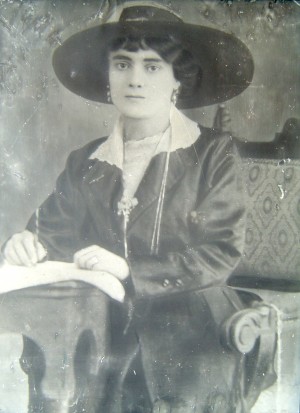You have no items in your cart. Want to get some nice things?
Go shopping Francisca Niebla is on her way to the town photographer’s. She is wearing a long dark costume and a heavy white lace blouse and a broad-brimmed black hat. The chain of a gold fob watch peeps from her coat. Or maybe it’s the chain of her pince-nez which she has taken off for vanity. She is wearing her best jewellery — a large cross and crystal earrings. It is 1920, and she is eighteen.
Francisca Niebla is on her way to the town photographer’s. She is wearing a long dark costume and a heavy white lace blouse and a broad-brimmed black hat. The chain of a gold fob watch peeps from her coat. Or maybe it’s the chain of her pince-nez which she has taken off for vanity. She is wearing her best jewellery — a large cross and crystal earrings. It is 1920, and she is eighteen.
In her coat pocket she has money from her aunt for the photograph. It’s a bright morning in March and she arrives early for her appointment. The studio is cool after the heat of the streets.
The photographer’s assistant welcomes her and brings her a glass of water and offers to take her hat but no, she will keep it on for the portrait. His wife takes the money and writes down her details in a ledger, slowly and carefully, pausing with nib aloft after each word and figure she writes.
The photographer introduces himself and asks her to stand beside the prop table but she is short so maybe sitting would be better. She sits in the grand prop chair and he gives her a pen and the records book. She is very short so he asks her to sit right on the edge of the chair, and the assistant fetches a cushion. She leans forward, poised with the pen. He looks at her through his lens. She is a very beautiful young woman, sweet and grave in her black hat. She sits very still for her photograph.
A week later she makes the same trip into town to collect the large framed portrait. She is pleased with it. It is wrapped in brown paper and string and she takes it home, where her father inspects the skill of the framing, is satisfied, and hangs it on the wall.
This will be the only likeness taken of Francisca Niebla. The following year she will meet a merchant sailor called Duminku and they will marry. She will give birth to a son, Juan. Duminku will be away at sea for much of the year and when Francisca falls pregnant again a year later they will decide to move the family to his home town of Bormla, Malta. Francisca’s family will say goodbye to them at the docks. Her mother will give her a new pair of gloves and her aunt, who is childless, will give her money. They will never see her or Juan again.
Francisca and Juan will move into a house on the hill in Bormla with Duminku’s brothers, Mosè and Abram, his sister Lehla, and Abram’s wife Philumena.
In Malta, Francisca and Juan will become Francesca and Gianni. Francesca will always remain Francesca now. Gianni will later become Johnny, or John.
Francesca will be homesick for La Línea, her hometown on the border of Spain and Gibraltar, a place she will never see again. She will sit on the high leather sofa in the house in Bormla, watching the tick of the great clock and sewing clothes for Juan and the new baby, sometimes mending sheets for the household, and sometimes looking at the pictures in Lehla’s magazines. The sofa is mahogany coloured and rubbed to a high shine like Lehla’s shoes. The glass of Lehla’s display cabinet will shine like crystal, polished every morning by Francesca, who will also shine each of its contents – the bell dome containing a stuffed heron whose glass eyes survey the room, and the red china cups and saucers which are never used.
Every morning also Francesca will take a stiff brush and brush the dust from the curtains and then with a broom she will sweep the parlour floor. Every day she will eat lunch of bread and goat’s cheese in the kitchen with Lehla and Philumena, but they will talk fast together and she won’t be able to follow the conversation. Duminku will send Lehla money for housekeeping, but Francesca will be too shy to ask what it gets spent on.
She will die giving birth to her second child in the house in Bormla. Her baby will die soon after. The name of this baby will be forgotten.
Motherless Gianni will be brought up by his aunts while his father is at sea. His father will never remarry.
Gianni will not go to school and will never learn to read and write. One day before the festa he will play with fireworks on the roof and perforate both his eardrums. For the rest of his life he will be somewhat deaf.
Bombs will rain on Malta as Hitler tries to reach Africa, and the children will beg for food from the American soldiers. When the war ends Gianni will be twenty-one. He will marry Filipa Mifsud, a girl from Birkirkara whom he will meet at a dance in Valletta. He will sign a cross for his name on the marriage certificate. They will name their first child Francesca.
When Duminku goes to visit his brothers and sister on his trips home, he will take little Francesca with him and they will sit in the parlour on the high leather sofa. Where it is patched and crackled, the horsehairs will poke through and prickle Francesca’s legs. She will not be allowed to touch the display cabinet, but she will look at the pictures of the Princesses Elizabeth and Margaret in Lehla’s magazines.
Little Francesca will also love to look at Duminku’s tattoos, bluey-green like the sea. One says Francesca, with a heart. This makes little Francesca laugh and blush.
When a second child, Mary, is born, Filipa and Gianni will decide to leave for England, taking Gianni’s father Duminku with them. They will arrive just in time for the Queen’s Accession.
In London Duminku will become Dominic, Gianni will become John, Filipa will become Phyllis, and little Francesca will become Frances. Mary will get to keep her own name. More children will arrive — Joseph and Charles.
Duminku, now Dominic, will take a job washing dishes at the Cumberland hotel to help bring in money for John’s family. He will be given overalls to wear, which will get soaked every evening as he stands over a huge sink scrubbing pots with a brush. One night a smog will descend, belched out by the chimneys of Battersea Power Station. The buses won’t run, and Dominic will try to find his way home to Brick Lane on foot. He will get lost and spend all night wandering in the smog. A week later he will be dead.
Filipa’s next child will be named Dominic, for Duminku.
Johnny will work at the Truman Brewery for years. Skinny, deaf, illiterate, and with faltering English, he will be a good worker. At home he will make things – armchairs, leather shoes, dolls’ houses. Later, when the family buys a television set, he will roar with laughter at the old black and white silent films, the Charlie Chaplins and the Laurel and Hardys.
Greenfingered Phyllis will grow vegetables in pots and, much later, in the garden of her prefab. She will long for chickens, and try to hatch eggs in socks on the radiator.
The portrait of Francesca Niebla will hang on Johnny’s wall. When Johnny dies in the royal wedding year, his daughter Frances will ask for it and hang it on her wall, where it will hang for nearly twenty years until she moves house and, having no space to hang it, puts it in the loft.
There it will remain for eight years, after which Frances’s daughter, the writer, will rescue it. Her torch light will fall on the face that looked down from the wall throughout her childhood, and she will pull it out of the box, wipe the dust from the glass, and recognize it. Francesca Niebla will whisper to her great-granddaughter, “I know many stories.”
Later still, Frances’s daughter will show the portrait to her own daughter, who is already beginning to resemble Francesca Niebla.
All of this will really happen. But eighteen year old Francisca knows nothing of this as she stands in her father’s parlour in La Línea proudly showing the portrait to the aunt who paid for it, and who is pleased with her investment. When her aunt has finished drinking her tea and admiring the portrait, Francisca shows her to the door and stands there watching her walk down the road towards the rock of Gibraltar and the sea. The world seems rich with possibility as Francisca steps onto the threshold of her life.

About Uschi Gatward
Uschi Gatward was born in East London and lives there now. She has been shortlisted for the Asham Award and the Bristol Short Story Prize. Her story 'Pink Lemonade' is in the Bristol Short Story Prize Anthology (vol 6) published October 2013. She is currently a guest blogger for Mslexia .





I love reading this story again, as much as I did listening to its first reading a few years ago at our Black History Month literary event for Writing Our Legacy.
Well done Uschi!